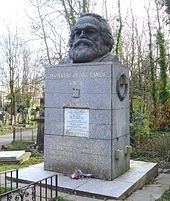|
|
| |
|
|
| |
|
|
|
|
| |
 |
| Karl Marx rejected
the positivist sociology of Comte but was of
central influence in founding structural social
science. |
Sociology
Sociology is the study of societies and how humans act
in groups. Sociology is a social science. People who
study sociology are called sociologists.
Auguste Comte (1789 - 1857) was first to use the term.
The problems caused by the change to an industrial
society, where many people moved to cities and worked in
factories, was an early focus of sociology. Karl Marx,
Max Weber and Émile Durkheim were leading figures in the
study of social phenomena. Themes included: community,
authority, status, alienation and lack of power.
In the 2000s, sociology looks at such things as: race,
ethnicity, class, gender, the family and social
interaction. It also studies the breakdown of social
structures; crime and divorce. Sociology can also be
looked at as the study of the worldwide society. A
society is the community of people living in a
particular country or region and having shared customs,
laws, and organizations. |
|
What do sociologists do?
Sociologists research the structures that organize
society, such as race, gender (whether a person is male
or female), and social classes (rich or poor).
Most sociologists work in one or more specialty areas or
"sub-fields". Sociology includes many sub-fields that
examine different aspects of society. For example,
social stratification studies inequality and class
structure in society. The field of demography studies
changes in a population size or type. The field of
criminology examines criminal behavior and crime.
Political sociology studies government and laws.
Sociology of race and sociology of gender examine how
people think about race and gender.
Many sociologists also do research outside of the
university. Their research helps teachers, lawmakers,
and government administrators to make better
institutions, government programs, and rules.
Sociologists often use statistics to count and measure
patterns in how people act or behave. Sociologists also
interview people or hold group discussions to find out
why people behave in certain ways. Some sociologists
combine different research methods.
|
|
History of sociology
Social analysis has been done since the time of Plato.
Sociology became a type of science in the early 1800s.
European cities were changing as many people moved into
cities and began working in factories. Sociologists
tried to understand how people interacted and how groups
interacted.
The word "sociology" was invented by French thinker
Auguste Comte in 1838. Early thinkers who wrote about
sociology included Karl Marx and Max Weber.
Sociology was taught in a university for the first time
at the University of Kansas in 1890. The first European
department of sociology was founded in 1895 at the
University of Bordeaux by Émile Durkheim. The first
sociology department to be established in Britain was at
the London School of Economics and Political Science in
1904. In 1919 a sociology department was established in
Germany at the Ludwig Maximilians University of Munich
by Max Weber. |
|
|
|
|
|
|
|
|
|
|
|
|
|
|
|
|
|
|
Search Fun Easy English |
|
|
|
|
|
|
|
|
|
|
|
|
|
|
|
About
Contact
Copyright
Resources
Site Map |